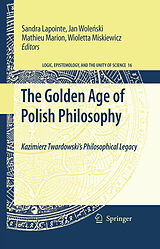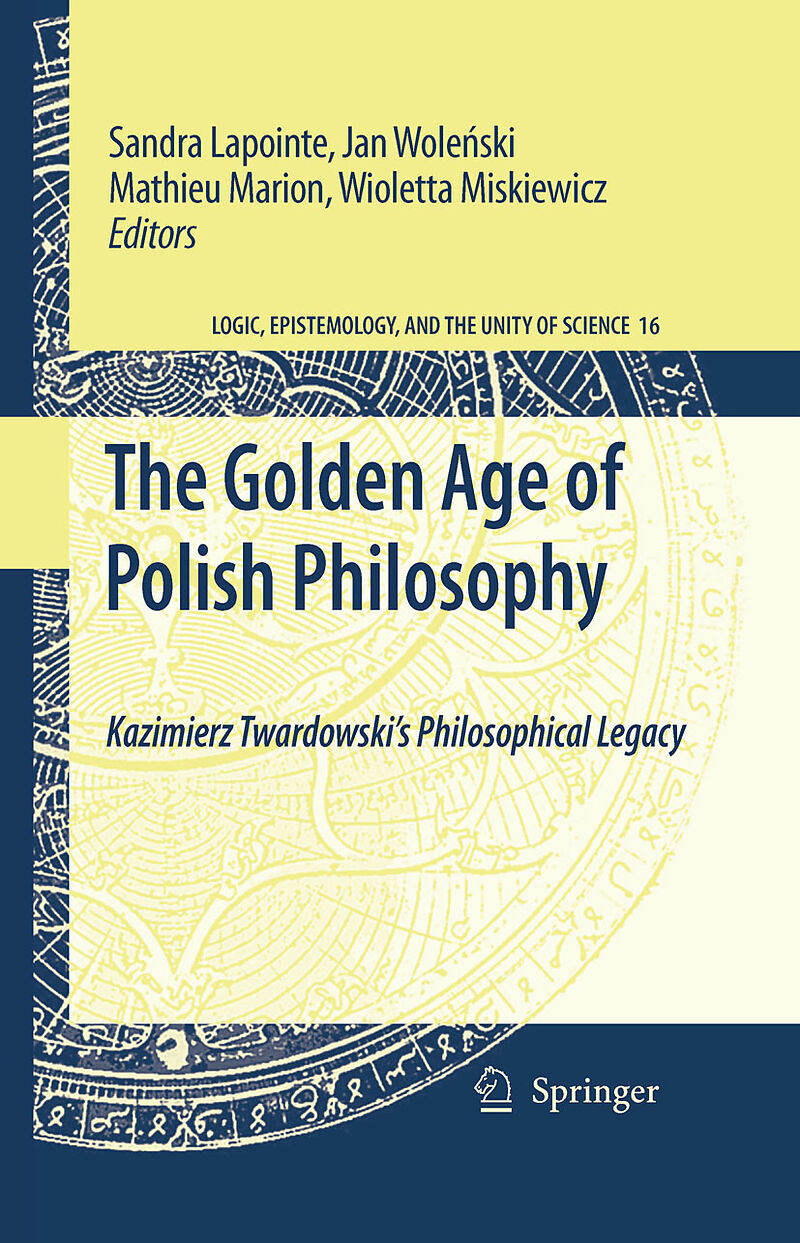The Golden Age of Polish Philosophy
Einband:
Fester Einband
EAN:
9789048124008
Untertitel:
Kazimierz Twardowski's Philosophical Legacy
Genre:
Philosophie & Religion
Herausgeber:
Springer
Auflage:
2009 edition
Anzahl Seiten:
254
Erscheinungsdatum:
28.05.2009
ISBN:
978-90-481-2400-8
This volume tells the story of the Polish or Lvov-Warsaw School of analytic philosophy, founded by phenomenologist Kazimierz Twardowski, which presented an alternative "working" picture of the unity of science and originated some key philosophical trends.
Jan Wolenski ´ and Sandra Lapointe Polish philosophy goes back to the 13th century, when Witelo, famous for his works in optics and the metaphysics of light, lived and worked in Silesia. Yet, Poland's academic life only really began after the University of Cracow was founded in 1364 its development was interrupted by the sudden death of King Kazimierz III, but it was re-established in 1400. The main currents of classical scholastic thought like Thomism, Scottism or Ockhamism had been late about a century to come to Poland and they had a considerable impact on the budding Polish philosophical scene. The controversy between the via antiqua and the via moderna was hotly 1 debated. Intellectuals deliberated on the issues of concilliarism (whether the C- mon Council has priority over the Pope) and curialism (whether the Bishop of Rome has priority over the Common Council). On the whole, the situation had at least two remarkable features. Firstly, Polish philosophy was pluralistic, and remained so, since its very beginning. But it was also eclectic, which might explain why it aimed to a large extent at achieving a compromise between rival views. Secondly, given the shortcomings of the political system of the time as well as external pr- sure by an increasingly hegemonic Germany, thinkers were very much interested in political matters. Poland was a stronghold of political thought (mostly inclined towards concilliarism) and Polish political thought distinguished itself in Europe J.
Designed especially for the Anglo-American market and includes 18 original contributions to one of the most up and coming topics in the field of the History of Analytical philosophy in the Anglo-Saxon world Contains a comprehensive Introduction that situates and describes the topic in great detail Contains contributions by some of the leading figures of Anglo-American as well as European Analytical Philosophy (e.g., Wolenski, Linsky, Mancosu, Murawski, Panaccio, Patterson) Likely to become a mandatory reference work for anyone interested in the History of Analytical Philosophy and the History of Philosophy in general Provides an extensive survey of all aspects of Polish philosophy in the 20th Century relating them to all major contemporary areas of research: logic, epistemology, history of science, semantics, philosophy of religion, etc.
Autorentext
PhD Mathieu Marion, Oxford, 1991. Publications in Philosophiques, Synthese, Philosophia Scientiae.
Klappentext
This volume portrays the Polish or Lvov-Warsaw School, one of the most influential schools in analytic philosophy, which, as discussed in the thorough introduction, presented an alternative "working" picture of the unity of science. The school was founded by a phenomenologist, Kazimierz Twardowski, who trained a team of researchers that included some of the most important logicians and philosophers of the history of analytical philosophy, such as Tarski, Lesniewski and Lukasiewicz. The Polish School represented some of the most important trends in philosophy -- aristotelism; the history and philosophy of science; linguistics; the philosophy of logic and mathematics -- and offered an opportunity for all these philosophical disciplines to interact in a natural and fruitful way.
Inhalt
Twardowski and Polish Scientific Philosophy.- Polish Metaphysics and the Brentanian Tradition.- The Genesis and History of Twardowski's Theory of Actions and Products.- The Rise and Development of Logical Semantics in Poland.- French and Polish Conventionalism.- Philosophy of Logic and Mathematics.- A Philosophy of Many-Valued Logic. The Third Logical Value and Beyond.- Le?niewski's Systems and the Aristotelian Model of Science.- Le?niewski, Negation, and the Art of Logical Subtlety.- Philosophy of Mathematics in the Lvov-Warsaw School.- Tarski's Engagement with Philosophy.- Tarski on Definition, Meaning and Truth.- Polish Philosophy of Mind.- A Note on Henryk Mehlberg's Contribution to the Debate on the Mind-Body Problem.- Leopold Blaustein's Analytical Phenomenology.- Around Twardowski's School.- Nonclassical Conceptions of Truth in Polish Philosophy at the Beginning of the 20th Century.- Leon Chwistek's Theory of Constructive Types.- Konstanty Michalski on Late Medieval Nominalism.- Jan Salamucha's Analytical Thomism.

Leider konnten wir für diesen Artikel keine Preise ermitteln ...
billigbuch.ch sucht jetzt für Sie die besten Angebote ...
Die aktuellen Verkaufspreise von 6 Onlineshops werden in Realtime abgefragt.
Sie können das gewünschte Produkt anschliessend direkt beim Anbieter Ihrer Wahl bestellen.
Loading...
Die aktuellen Verkaufspreise von 6 Onlineshops werden in Realtime abgefragt.
Sie können das gewünschte Produkt anschliessend direkt beim Anbieter Ihrer Wahl bestellen.
| # | Onlineshop | Preis CHF | Versand CHF | Total CHF | ||
|---|---|---|---|---|---|---|
| 1 | Seller | 0.00 | 0.00 | 0.00 |
